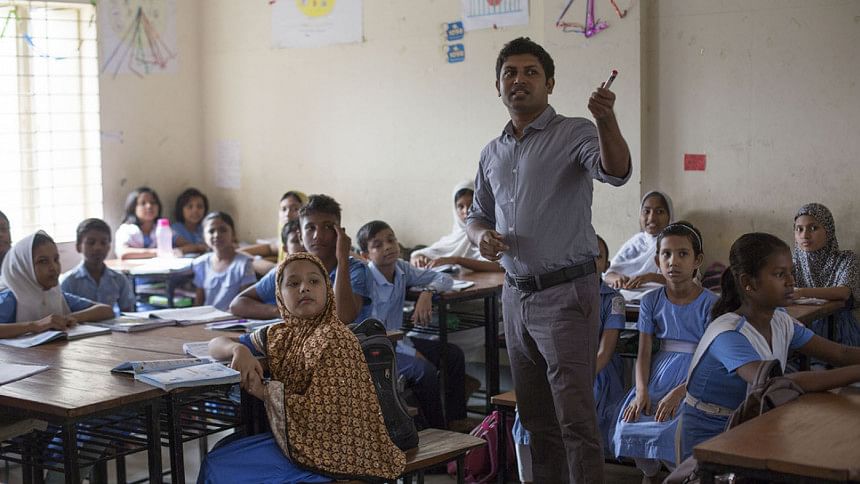Equip teachers to bring positive changes in education

Teachers are at the heart of educational reform and are pivotal in shaping students' academic success. Their influence was vividly demonstrated during the student's movement against Discrimination, where their advocacy for students' rights became a turning point for a just, fair, and equitable nation. Research consistently shows how teachers with the right skills, knowledge and attitude can ensure engaging and meaningful learning experiences. However, Bangladesh faces a severe shortage of quality teachers, particularly in rural and remote areas.
This crisis is compounded by systemic corruption in teacher recruitment, where nepotism often overshadows merit. There is also the problem of teacher absenteeism and high attrition rates, contributing to a decline in educational quality. A comprehensive review by SM Tazuddin (2020) exposes the grim reality of quality teacher shortage in schools and colleges. Low salaries, lack of career progression, and inadequate support drive teachers away. Many struggle to maintain a decent standard of living, as illustrated by a private schoolteacher, Shawgatul Islam, who says, "It gets very challenging to maintain family, social status and everything else with a teacher's limited salary." This economic strain often pushes teachers towards coaching centres and tutoring services, diverting their focus from classroom teaching.
Lack of career progression exacerbates the problem. Unlike other professions where promotions are expected, teachers often remain in the same role for years, with no clear path to advancement. This stagnation not only affects their motivation but also diminishes their social standing. Israt Jahan, a teacher with a decade of experience, reflects on her frustration, "My family often tells me that I could have done so much more." Such sentiments lead to lower job satisfaction among teachers and, ultimately, poorer student outcomes.
Erosion of respect and prestige for the teaching profession has reached alarming levels as well. While respect should be based on competence and credibility rather than blind obedience, the reverence teachers once commanded is fading. Today, teachers face diminishing support from parents and school administrations and are often left to manage disciplinary issues independently. As urban teacher Farjan Umm remarks, "Sometimes, parents come and tell me how I should conduct myself in the classroom and how their children should be treated, which undermines my authority and makes me feel powerless in managing my own classroom."
A report by the Campaign for Popular Education (CAMPE, 2023) highlights another critical issue: the rigid, top-down management structure in schools that stifles teachers' autonomy and creativity. Standardised class routines mandated by central authorities give teachers little flexibility to tailor lessons according to students' needs or explore innovative methods. This centralised approach, particularly problematic in rural areas, leaves 47.3 percent of rural teachers feeling that class time is inadequate. This lack of professional discretion significantly impacts teachers' well-being. Energised and supported teachers will likely remain committed and foster a thriving educational environment. Conversely, compromised well-being due to rigid management and lack of autonomy undermines their effectiveness and impacts students' long-term success. Schools that promote teachers' agency, provide strong social support, and reduce unnecessary administrative burdens see higher teacher satisfaction and retention.
The need for comprehensive, ongoing professional development is clear. Over 40 percent of teachers advocate for it as essential to their effectiveness, according to a 2023 Education Watch report. In contrast to countries like Bhutan, the Philippines, and Thailand, where nearly 100 percent of primary school teachers are trained, Bangladesh lags behind with only 74 percent. This gap is even more pronounced in rural areas. Teachers' training programmes in Bangladesh often lack practical application, focusing heavily on theory. To bridge this gap, training rooted in classroom observations and establishing professional learning communities for teachers are required to help them engage in meaningful dialogue and collaborative problem-solving.
Addressing teacher shortages, especially in underserved areas, requires more than training. It demands merit-based recruitment, regular performance evaluations, and practical incentives like housing and transport allowances. In many lower- and middle-income countries, including Bangladesh, pre-service and in-service teacher education remain theoretical, weakening their impact. Quality induction programmes aligned with teaching standards and evaluation strategies are essential for setting a strong foundation for new teachers.
Teachers also play a crucial role in addressing challenges like literacy, numeracy deficits, school dropouts, and climate action. Given Bangladesh's vulnerability to climate change, integrating climate education into the curriculum is vital. Teachers must lead this effort by incorporating practical lessons on environmental stewardship, renewable energy and sustainable agriculture, supported by school-based green projects and community partnerships. With teachers' leadership, we can prepare the next generation to take decisive action on climate issues.
Additionally, retaining girls in education is critical for teachers to make an unparalleled impact. Female teachers in particular serve as invaluable role models. However, according to Bangladesh Education Statistics (2022), only 30.66 percent of secondary school teachers are female. The gender imbalance is stark. Targeted training to address gender biases and societal expectations is essential for creating an inclusive learning environment that meets the unique needs of female students.
Recognising the importance of teachers in shaping the future, it is imperative that we invest in their professional development, support their autonomy, and restore the respect and prestige they once commanded. Without these changes, Bangladesh's dream of a quality education system will remain a dream.
Azwa Nayeem is chairperson of Alokito Hridoy Foundation and Alokito Teachers.
Views expressed in this article are the author's own.
Follow The Daily Star Opinion on Facebook for the latest opinions, commentaries and analyses by experts and professionals. To contribute your article or letter to The Daily Star Opinion, see our guidelines for submission.

 For all latest news, follow The Daily Star's Google News channel.
For all latest news, follow The Daily Star's Google News channel. 










Comments